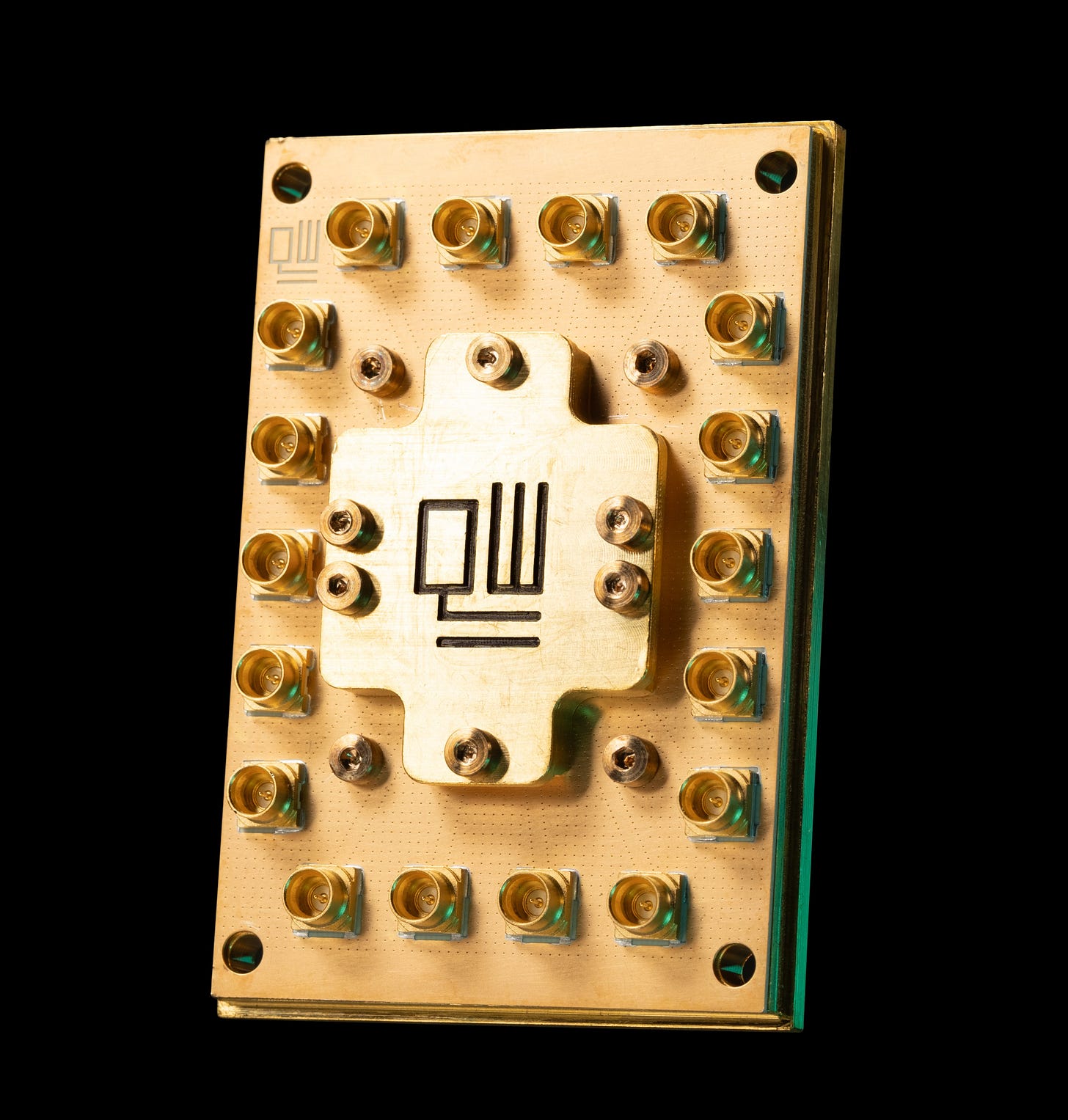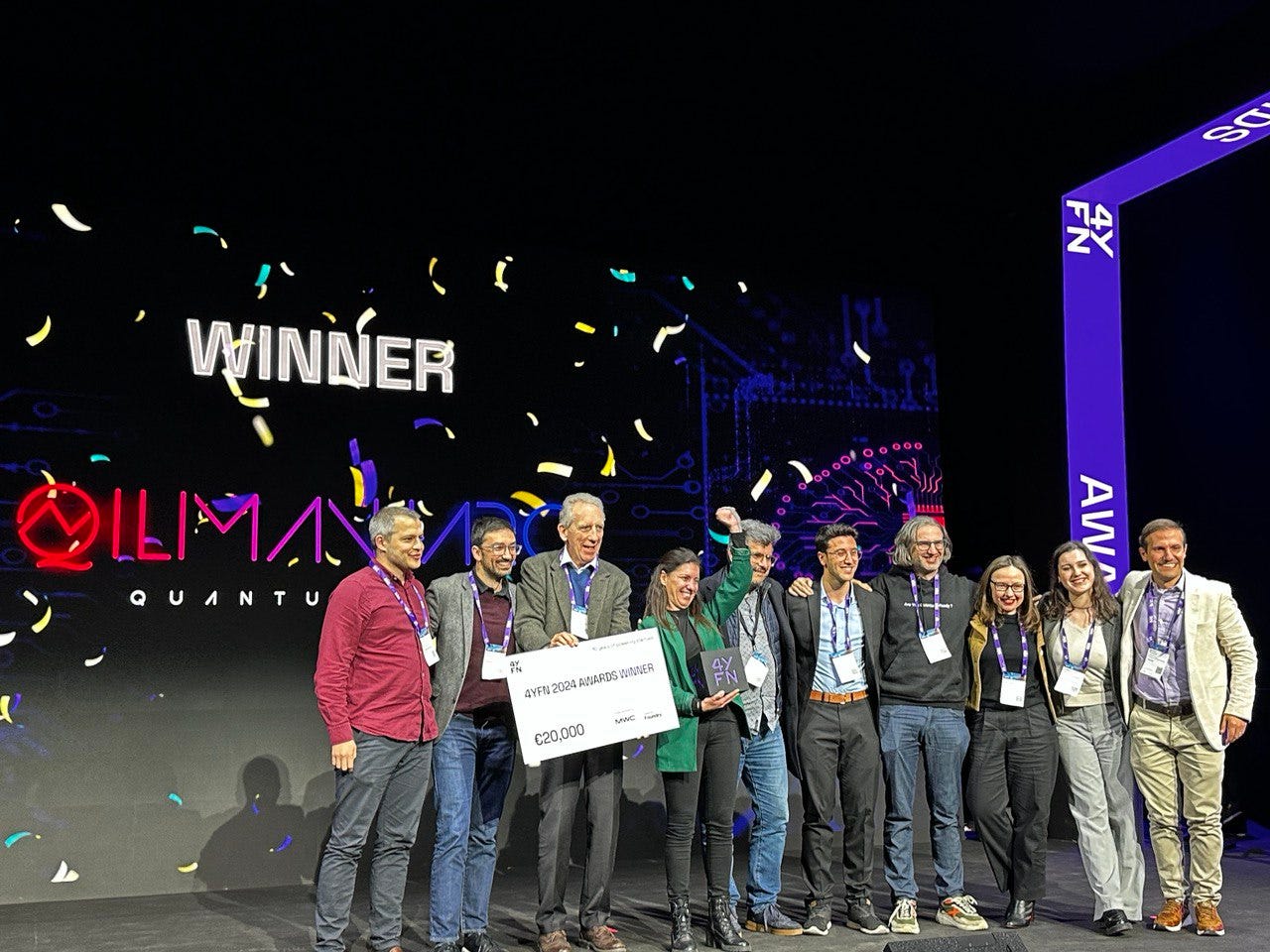The Week in Quantum Computing - March 4th 2024 - Rolls-Royce Eyes Space, Canada Invests $17.2M, Riverlane & Rigetti Partner with ORNL, D-Wave Launches Starter Course, QuantWare goes Soprano
Issue #175
Quick Recap
Rolls-Royce is taking quantum computing to new heights, aiming to operate nuclear power plants remotely for applications in mining colonies and extraterrestrial environments. This is part of the Quantum Technology Access Programme (QTAP), marking a significant step in nuclear safety and space advancements. Meanwhile, Riverlane and Rigetti Computing are partnering with Oak Ridge National Laboratory (ORNL) to explore the integration of quantum computers with large-scale supercomputing centres, creating a benchmarking suite, 'QStone'. The Government of Canada has announced a $17.2 million investment in the quantum technology sector, supporting 12 innovative companies and potentially creating up to 150 jobs. D-Wave Quantum Inc. has launched a starter course to address the significant skills gap in the field. On the research front, a study led by Matt McEwen and supported by the Simons Foundation presents a method to resist high-energy impact events in superconducting qubit arrays through gap engineering. Furthermore, Q-CTRL announced strategic partnerships with Wolfram, Aqarios, qBraid, Qblox, Keysight, and QuantWare to enhance quantum research and commercialization. The week concluded with two significant recognitions: John Preskill received the 2024 John Stewart Bell Prize for his contributions to quantum computation, and Japan revealed ambitious projects in all five major technologies for quantum computers as part of its Moonshot program. Lastly, QuantWare unveiled its next-gen quantum processors, Soprano-D and Contralto-D, at the Quantum Innovation Summit in Dubai.
Showcasing Quantum News Monthly. Two PhD students @debobiswas4 and @MingyuKang4 explain some of the major news and breakthroughs in a fantastic way. Definetely worth subscribing.
Classical vs Quantum Computing Face-off and Fault Tolerance gets a boost | Feb 2024 Quantum News
The Week in Quantum Computing
Rolls-Royce looks at viability of quantum computing in nuclear safety
Rolls-Royce aims to leverage quantum computing to operate nuclear power plants remotely, targeting applications in distant mining colonies and extraterrestrial environments like the Moon and Mars. This initiative is part of the Quantum Technology Access Programme (QTAP) with the goal of developing small, autonomous nuclear reactors.
Open-Source Solutions: The Key to Accelerating Quantum Technology Advancements
The article "Open hardware solutions in quantum technology" by Nathan Shammah and co-authors, published in APL Quantum, discusses the benefits of open-source ethos in quantum technologies. The authors, from various institutions such as Unitary Fund, Qruise GmbH, Technical University of Valencia, M-Labs Limited, and Lawrence Berkeley National Laboratory, among others, believe that open-source solutions can offer additional advantages in developing quantum technologies. They emphasize the necessity of open quantum hardware facilities and the importance of community building in this field.
Riverlane and Rigetti Computing Partner with Oak Ridge National Laboratory to Work to Improve HPC-Quantum Integration
Riverlane and Rigetti Computing have joined forces with Oak Ridge National Laboratory (ORNL), a US Department of Energy institution, to investigate the integration of quantum computers with large-scale supercomputing centres. The project will create the first-ever benchmarking suite, 'QStone', to measure the performance of a combined high-performance computing (HPC) and quantum system. This will be tested on ORNL's Summit, the world's fifth fastest supercomputer, using Riverlane's quantum error correction stack and Rigetti's quantum hardware. The results will be published, providing insights on interoperability and performance issues. Riverlane VP of Engineering, Marco Ghibaudi, and Rigetti CEO, Dr. Subodh Kulkarni, both expressed optimism about the project's potential to advance quantum computing and HPC integration.
Government of Canada announces support for southern Ontario’s quantum technology sector
The Government of Canada, represented by the Honourable Filomena Tassi, Minister responsible for the Federal Economic Development Agency for Southern Ontario (FedDev Ontario), and other parliament members, announced an investment of over $17.2 million in southern Ontario's quantum technology sector. This funding will support 12 innovative companies to advance and commercialize their quantum products and solutions, potentially creating up to 150 jobs. The investment forms part of the National Quantum Strategy and will fund projects ranging from quantum computing solutions, quantum-secure encryption platforms, to quantum algorithm solutions for medical imaging.
Building a Quantum-Ready Workforce: D-Wave Launches Starter Course to Bridge Critical Skills Gap
D-Wave has launched a starter course to address the significant skills gap in the quantum computing field. The initiative aims to equip a new generation of workers with the necessary knowledge and competencies to operate in the evolving quantum computing landscape. This move underscores the growing demand for quantum-ready talent in the tech industry and D-Wave's commitment to fostering such expertise.
Paper: Resisting high-energy impact events through gap engineering in superconducting qubit arrays
The research led by Matt McEwen and 26 other authors, supported by the Simons Foundation, presents a method to resist high-energy impact events in superconducting qubit arrays through gap engineering. The study reveals that engineering different superconducting gaps across a qubit's Josephson junctions can prevent quasiparticle (QP) tunneling, which induces correlated errors. The team fabricated all-aluminum transmon qubits with both strong and weak gap engineering, observing that strongly gap engineered qubits remained stable during high-energy impact events, while weakly gap engineered qubits showed correlated degradation.
https://arxiv.org/abs/2402.15644v1
Q-CTRL teams up with Wolfram, Qblox, and others to deliver a complete quantum computing toolset for researchers and enterprises
Q-CTRL, a leading developer of quantum infrastructure software, has announced strategic partnerships with Wolfram, Aqarios, qBraid, Qblox, Keysight, and QuantWare. The collaborations aim to enhance quantum research, commercialization, and adoption by integrating Q-CTRL's AI-driven performance-management software and quantum control capabilities with various hardware and software platforms. The integrations will enable a wider range of end-users to tackle complex problems in the field. Alex Shih, Head of Product at Q-CTRL, said the goal is to make quantum technology useful by supporting researchers in advancing their projects.
A classical foreshadow of John Preskill’s Bell Prize
John Preskill, Richard P. Feynman Professor of Theoretical Physics at Caltech, has been awarded the 2024 John Stewart Bell Prize for his contributions to quantum computation, particularly his work on the NISQ (noisy intermediate-scale quantum) era and the classical shadow formalism. The latter, a joint work with Hsin-Yuan Huang and Richard Kueng, proposes new machine learning algorithms for processing quantum information. Preskill's leadership at Caltech's Institute for Quantum Information and Matter (IQIM) was also recognized, as he fostered collaborations among physicists, computer scientists, chemists, and mathematicians.
https://quantumfrontiers.com/2024/02/19/a-classical-foreshadow-of-john-preskills-bell-prize/
Focal Point on Quantum computing in Japan
Japan is ambitiously pursuing projects in all five major technologies for quantum computers as part of its Moonshot program, with the goal of developing a fault-tolerant quantum computer by 2050. The technologies include superconductors, light-based systems, silicon-based systems, trapped ions, and a hybrid system of atoms and photons. Each approach offers unique advantages, such as scalability, speed, or capability to handle real-life problems. This high-risk, high-reward program brings together scientists with a broad range of expertise. The main components for universal quantum computers are being developed in three major projects in Japan.
https://www.nature.com/collections/gieejcdceg
QuantWare releases Contralto-D and Soprano-D: the next generation of Quantum Processors
QuantWare unveiled its next-gen quantum processors, Soprano-D and Contralto-D, at the Quantum Innovation Summit in Dubai. These processors offer improved specifications, enhanced reliability and usability, and 6x more value for money compared to competitors. They boast average coherence times of 60 µs, single qubit gate fidelities of 99.9%, and a two-qubit gate fidelity of 99.7%. With the company's Crescendo-S J-TWPA, users can achieve readout fidelities of 97.5%. Both processor lines have halved lead times and offer a cryogenic pre-characterisation report. The cost starts at 60k and 300k Euros for Soprano-D and Contralto-D, respectively. CEO Matthijs Rijlaarsdam emphasized their aim to make quantum computing more efficient.
https://www.quantware.com/press/generation-d-quantum-processors
Paper: Real-time scattering in the lattice Schwinger model
Irene Papaefstathiou, Johannes Knolle, and Mari Carmen Bañuls have published a study on real-time scattering in the lattice Schwinger model. The researchers utilized tensor network methods to examine equilibrium properties of lattice gauge theories, specifically simulating the real-time collisions of composite mesons. They observed the opening of an inelastic channel, which produced two heavier mesons and identified a momentum threshold. The team proposed local quantities to detect the products of the collision in the strong coupling regime, which could be measured in current quantum simulation platforms. The study exemplifies the potential of tensor network methods in exploring out-of-equilibrium scenarios in quantum physics.
https://arxiv.org/abs/2402.18429v1
New Approach Simplifies Quantum Computing, Boosts Efficiency
Researchers from the Institute for Quantum Computing and the Department of Combinatorics and Optimization at the University of Waterloo, and the Department of Physics and Astronomy at the University of Exeter have proposed a new approach to quantum computing. The method simplifies Hamiltonians, mathematical operators used in quantum mechanics, by eliminating non-essential qubits, reducing the complexity of quantum simulations. The approach also allows for the parallelization of quantum simulations on both classical and quantum platforms. Researchers Lane G Gunderman, Andrew Jena, and Luca Dellantonio are behind this development which could have wide-ranging applications, including in quantum machine learning, optimization tasks, and tensor network techniques.
https://quantumzeitgeist.com/new-approach-simplifies-quantum-computing-boosts-efficiency/
U.S. Quantum Director Charles Tahan Urges Congress to Reauthorize National Quantum Initiative Act, Stresses on Quantum Workforce Development and Commercial Utility of QIS Discoveries
Charles Tahan, the U.S. Quantum Director and head of the National Quantum Coordination Office (NQCO), is calling for the reauthorization of the National Quantum Initiative Act (NQIA) of 2018. The NQIA, initially authorized for five years, has been held up in Congress but is expected to be renewed this year. Tahan emphasizes the importance of this reauthorization for the advancement of quantum information science (QIS). He highlights the National Q-12 Education program and the need to build a quantum workforce. Tahan also outlines recommendations for the reauthorized NQIA, including expanding authorized agencies, translating QIS discoveries into commercial utility, and prioritizing funding to upgrade laboratory facilities.
Quantum Computing Inc. Launches Quantum Optimization Machine
Quantum Computing Inc. (QCi) has unveiled its fully commercialized quantum optimization platform, the Dirac-3 Entropy Quantum Computer (EQC). This nanophotonic machine is designed to solve complex problems with large numbers of variables using nonlinear quantum optics. The Dirac system, which operates at ambient temperature and requires no special infrastructure, is unique in its ability to solve integer problems using quantum digits (qdits), each with a dimension of 200 discrete modes. The company recently secured a contract with NASA to use Dirac for optimizing spectral analysis of LiDAR from lower earth orbit. The device is priced at $300,000, including installation and warranty. CEO Dr. William McGann anticipates the technology will revolutionize industries such as healthcare, finance, and supply chain.
https://finance.yahoo.com/news/quantum-computing-inc-launches-quantum-130000034.html
Spanish quantum computing startup Qilimanjaro Quantum Tech wins 4YFN competition at Mobile World CongressÂ
Spanish quantum computing startup, Qilimanjaro Quantum Tech, has emerged as the winner of the 4YFN competition at the Mobile World Congress 2024, attended by over 100,000 people. The startup, a spin-off from the Universitat de Barcelona, the Barcelona Supercomputing Center, and the Institut de Física d’Altes Energies, is developing highly accurate quantum chips and is the only competitor in its sector in southern Europe.
https://novobrief.com/spanish-startup-qilimanjaro-quantum-tech-wins-4yfn-competition-at-mwc/10971/



